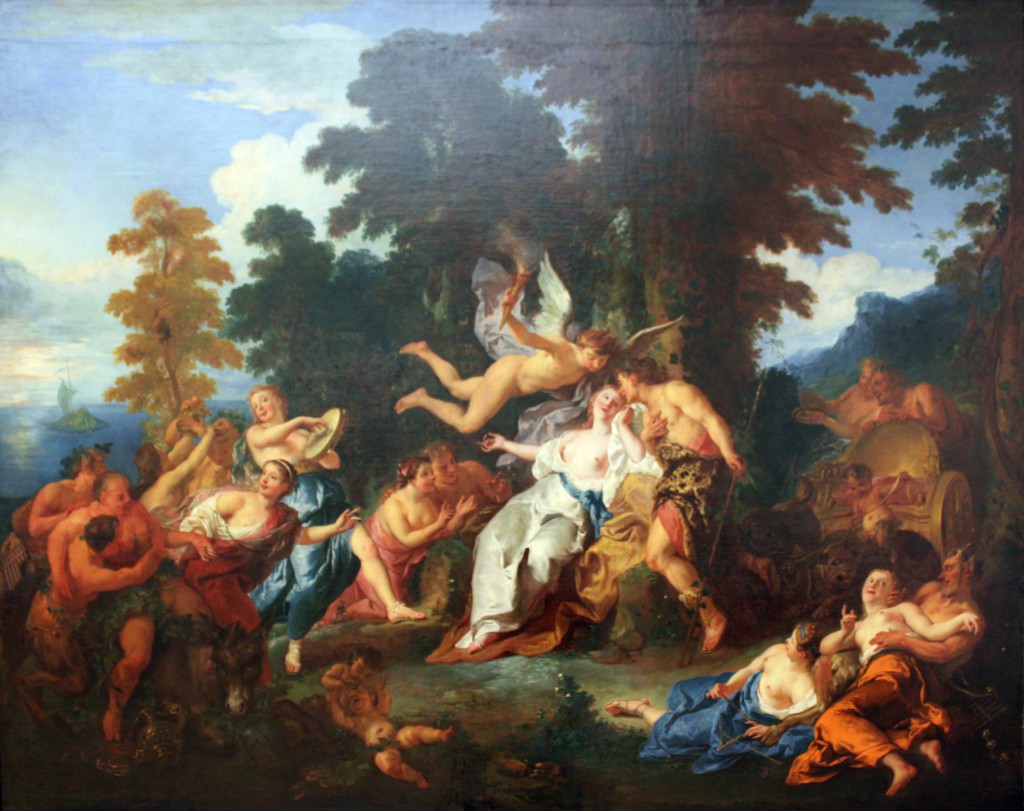Translation and notes by Jack Vaughan
In this passage by Nonnos, Ariadne has been deserted on Naxos by the hero Theseus. As she lies on the lonely shore sleeping, she is discovered by the god Dionysus who transfigures the human woman into the goddess that defines Ariadne.
265 Bacchus [=Dionysus] now leaving Ilissos’ honey-sweet watercourse [in Attica], comes in joyous procession with his reveling troop to the vine-clad island of Naxos.
About Dionysus the Liberator, bold Eros fluttered his wings and the goddess of the love-cult of Cythera [Aphrodite], led the procession of Lyaeus [Dionysus], who was about to get married. Just now, you see, obdurate Theseus, abandoning his promises to the winds, had sailed away, abandoning the virginal young woman who had left her homeland[1], alone, asleep on the Naxian seashore. 272 But Dionysus, as he gazed on deserted sleeping Ariadne, mixed love with wondrous amazement. To his Bacchic women attendants weaving sounds of music with processional dancing, he [=Bacchus] in awestruck voice delivered this careful speech, “Bassarids[2], do not shake your tambourines or sound your drums and let there be no sound of footfall or pipes. Let Aphrodite sleep[3]. But she is not holding the irresistible embroidered breaststrap [cestus] of the Cyprus-born goddess[4]. I am overwhelmed and won over, as Charis[5] swooned and became wed to inveigler Hypnos [=Sleep]. But since first light is here and dawn will be soon shining bright, 280 rouse sleeping Pasithea[6]! Who on Naxos, who here dressed the nude Grace? Was it not Hebe[7]? But for whom did she leave the Cup of the Blest[8]? Is not the radiant [moon-goddess] Selene, driver of the oxen[9], reclining on [the horizon of] the deep sea[10]? Why is she[11] passing the night without her usual [bedfellow], sleeping Endymion? 285 Do I not see head-to-foot silver-haloed Thetis[12] on the shoreline? But she is not exposing her roseate body! If it is right to say so, the Naxian Arrow-Showerer [Artemis =, here, Ariadne] is pausing from the labors of the hunt, cleansing with seawater sweat of the toils of beast-killing. Ah, yes, labor always brings on sweet sleep. But who saw in the thicket Artemis dressed in trailing long tunic? Wait here, Bacchantes. Stand where you are, Maron[13]. Do not gambol or tread any closer! Stop the shrill music, Pan, quiet, my friend! Do not break the morning sleep of Athena [here = Ariadne]! To whom did Pallas leave her spear? Who will pick up and wear the bronze helmet and carry the aegis of Tritogeneia[14]?” 295 So spoke Bacchus, but the dispirited lovesick girl, shaking off sleep, rose up from the sand. Looking around, she did not see the artful deceiver [Theseus] who was to be her husband or his watercraft. With the halcyons[15] the Cydonian [=Cretan] nymph cried out laments as she walked the beach to the water’s edge, the loud-roaring wedding-gift of lovers’ passions. 300 She called out the young man’s name and she raged as she walked the seashore surveying the sea for a glimpse of the boat. And she was angry with Hypnos, the god of jealous sleep, and reproached mother sea more than the Paphian goddess [Aphrodite]. She prayed to Boreas and invoked the gale-force winds that are called on in oaths and Oreithyia who is invoked in oaths, as she prayed that the wind would 305 force the young man [Theseus] back to the shore of Naxos and that she would again see the sweet sight of his boat. And she entreated implacable Aeolus [god of winds]. Hearing the maiden’s prayers he was moved and granted her prayer and dispatched a gale-force headwind blowing against [Theseus’ boat]. But Boreas[16], himself tormented by love, did not pay attention to the girl driven wild by passion, so even the winds, jealous perhaps, soon were angry with the young woman and at length they transported the ship to Attica. But Eros himself was amazed at the young woman and on happy [lit. “free of grief”] Naxos he thought he saw Aphrodite lamenting.
Nonnos Dionysiaka 47. 265–313, translation and notes by Jack Vaughan
Jack Vaughan
Jack is a Texas attorney-arbitrator who privately kept up his pre-law interests in Ancient Greek poetry, history, and philosophy and other Eurasian studies. He was educated in the United States and Europe and in classics and philosophy is an alumnus of the University of Texas at Austin (BA with High Honors) and the Universität Hamburg (MA). Recently widowed and in semi-retirement from law, dividing his time between law matters and historical studies, he was an actively participating learner in HeroesX v2 in 2013 and Community TA in modules of HeroesX v3, and has been an active Hour 25 Community Development team member since January 2014.
Notes
[1] Ariadne, having left Crete
[2] “foxes”=Bacchae, women followers of Bacchus who wore fox caps
[3] = Ariadne, compared here and in the rest of the speech to various beautiful and powerful goddesses
[4] as Aphrodite might when striking passion into a man’s or a god’s heart
[5] = Grace; here as elsewhere in Nonnos the Grace Pasithea
[6] here = Adriadne, compared to a Grace
[7] Goddess of Youth
[8] the golden bowl or cup of the sun-god Helios in which he is carried over Okeanos from west to east at night, another metaphor exalting Ariadne
[9] constellation last to set in the night sky
[10] another metaphor of sleeping Ariadne
[11] = Ariadne, compared to Selene
[12] Nereid sea-goddess, here = Ariadne
[13] a male member of Dionysus’ troop
[14] shield of Athena (“Trito-born”), imagined with alter-Athena Ariadne
[15] legendary seabirds, usually identified as kingfishers
[16] the north wind, personified
Image credit
Jean François de Troy, Bacchus and Ariadne, Bode Museum Creative Commons Attribution-NonCommercial-SharAlike 3.0 Germany
via https://commons.wikimedia.org/wiki/File:1717_de_Troy_Bacchus_und_Ariadne_anagoria.JPG
